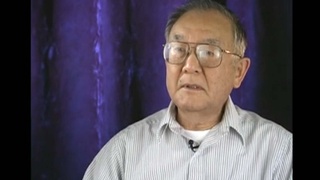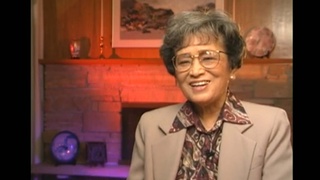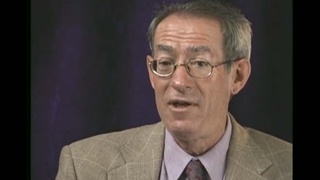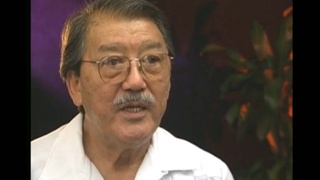Interviews
Signing of the bill
Then we were all at the Seattle JACL convention in 1988, and we got word that tomorrow morning, President's going to sign the bill. "He's going to sign the bill?" And we're all sitting in Seattle. So everyone makes airplane reservations, and we called the White House and said, "He can't just sign the bill, this has to be a public ceremony. And we'll all fly out and we'll get everyone there." So they said, "Okay, we'll make it a signing ceremony," and they said, "We'll do it at," I don't know, "eleven o'clock in the morning."
So everyone was flying, just racing around trying to get reservations on the airplane to get from Seattle, Washington, to Washington, D.C. Everyone was going on the red-eye, and we all get to the White House and we're all bleary eyed, and we're all there watching the ceremony that President Reagan signed the bill.
There's a picture of the President signing the bill, and so I was saying to Pat Saiki, I said, "Hey Pat, look at that signature there." Because that was my signature on the bill as Speaker pro tem on what they called the red line copy of the bill that the President signs. Because it was Sparky Matsunaga as President pro tem of the U.S. Senate, me as Speaker pro tem of the U.S. House, and then President Reagan with him signing the bill. And I thought, where else but only in a country like the United States could this, something like this happen?
Date: July 4, 2008
Location: California, US
Interviewer: Tom Ikeda
Contributed by: Watase Media Arts Center, Japanese American National Museum
Explore More Videos

Fighting For What’s Right
(1923–2006) Community activist. Co-founded the Manzanar Committee

Evolving History
(1929 - 2014) One of the earliest proponents behind the redress movement.

Need for Monetary Compensation
(1923–2008) One of the leaders behind the redress movement.

Erasing the Bitterness
(1923–2008) One of the leaders behind the redress movement.





Duties of the Witness Chair
Chaired the Chicago JACL's Redress Committee.






